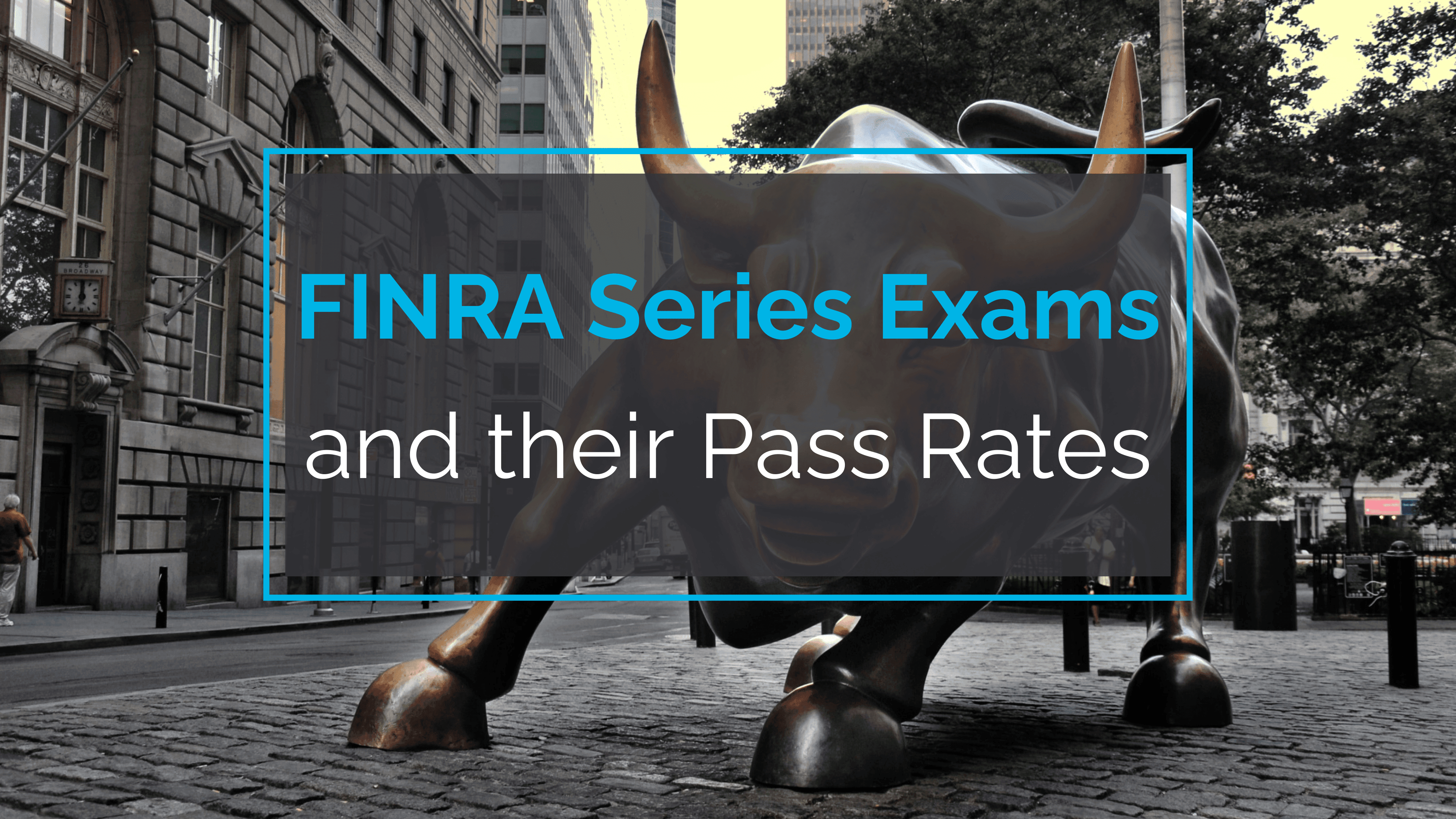
Thinking of getting a job in the finance industry? It’s not surprising as it is one of the most high-paying jobs you could have in the United States. But if you plan to delve into the world of securities and insurances, you must pass the qualifying exams administered by FINRA, which will allow you to engage in those areas of the industry.
FINRA doesn’t publish pass rate data for every exam, so we’ve done our best to research and consolidate all the data we could find. The exact pass rates might be a little different from what we’ve listed here, but you can feel confident that they’ll be close.
The following is a list of ALL the FINRA exams with all the basic details you would need to know before registering to take the exam. Let’s get started.
The Securities Industry Essentials (SIE) exam is an introductory-level exam from FINRA for those who want to start a career in the securities industry. This exam evaluates a candidate’s knowledge of basic concepts that is fundamental to working in the industry. This includes types of products and their risks; prohibited practices; and the structure of the securities industry markets, regulatory agencies, and their functions.
The SIE is open to anyone 18 years old and above. You don’t have to be associated with a firm to take the SIE. Results are valid for four years.
Achievable has an excellent FINRA SIE prep course for $74 – try it for free and see for yourself.
The Series 6 is an exam that assesses the ability of a candidate to perform their job as an investment company and variable contracts products representative. The Series 6 exam covers topics on mutual funds, securities, variable annuities, and tax regulations, as well as retirement plans and insurance products.
Series 6 exam takers should take and pass the SIE exam before taking this test. Candidates must also be associated and sponsored by a FINRA member firm or a Self-Regulatory Organization.
The Series 7 is an exam that assesses the ability of a candidate to perform their primary job as a general securities representative, which includes sales of corporate securities, investment company securities, municipal securities, variable annuities, options, direct participation programs, and government securities.
The Series 7 exam covers topics on investment risk, equity, taxation, and debt instruments. It also focuses on packaged securities, retirement plans, and interactions with clients. Ideally, Series 7 examinees should take and pass the SIE exam before taking this test, and must also be associated and sponsored by a FINRA member company or a Self-Regulatory Organization.
Achievable has an excellent FINRA Series 7 course as well – peek inside and check it out.
The Series 22 exam tests the knowledge and eligibility of professionals who seek to work as direct participation representatives; to solicit and sell interests in Direct Participation Programs such as real estate, agriculture, oil and gas, equipment leasing, and limited partnerships.
The Series 22 exam covers topics on investment, taxation, information and privacy regulations, and analyzing investment profiles. This exam should be taken after passing the SIE exam, and after being associated and sponsored by a FINRA member or a Self-Regulatory Organization.
The Series 57 exam is required for individuals looking to work as a securities trader representative. It measures their knowledge and competency in executing transactions in equity trading. It covers topics on trading activities, record-keeping and reporting, handling transactions, and general trading practices.
Candidates must be associated and sponsored by a FINRA member firm or a Self-Regulatory Organization (SRO) to be eligible to take FINRA representative-level qualification exams.
The Series 79 exam measures the candidate’s knowledge to perform the job of an investment banking representative, including skills on advising on or facilitating debt or equity securities offerings, and mergers and acquisitions.
The Series 79 exam covers topics on data analysis, underwriting, securities registration, SEC rules and regulations, and financial restructuring. Ideally, Series 79 examinees should take and pass the SIE exam before taking this test. Exam takers must also be associated and sponsored by a FINRA member company or a Self-Regulatory Organization.
The Series 82 exam measures the candidate’s knowledge as a private securities offerings representative, which includes their primary job of solicitation and sale of private placement securities products as part of a primary offering.
The exam’s content is focused on private securities and private placement transactions. Topics covered include stocks, corporate securities, investment planning, handling customer accounts, and industry regulations. The Series 82 exam is a corequisite of the SIE exam, which can be taken separately. Exam takers must also be associated and sponsored by a FINRA member company or a Self-Regulatory Organization.
The Series 86 exam is a required test for those who want to work as a research analyst for brokers and dealers. It assesses the understanding of the candidate on the topics of financial metrics, earnings modeling methods, and industry dynamics.
To be eligible to take the exam, candidates must be associated with and sponsored by a FINRA member firm or self-regulatory organization. The SIE exam is a corequisite for the Series 86 exam. Those who already passed Level I and II of the CFA or CMT exams may request an exemption from this test.
The Series 87 is an exam required for those who want a career as a research analyst for brokers and dealers. It assesses the knowledge of the candidate on the topics of ethics and best practices for the industry.
To be eligible to take the exam, candidates must be associated with and sponsored by a FINRA member firm or self-regulatory organization. Like the Series 86, the SIE exam is a corequisite for this exam.
The Series 99 exam is a required test for those who aim to work as an Operations Professional. Topic included in the exam covers the basic functions of an operations professional, which includes customer onboarding, management and distribution of funds, loans and securities lending, and reinvestment and disbursements of funds.
A candidate must be associated with and sponsored by a FINRA member firm or a self-regulatory organization. The SIE exam is a corequisite to the Series 99 exam, so in order to be registered as an operations professional, candidates must pass the Series 99 and the SIE exams.

The Series 4 exam assesses the competency of a candidate to perform their job as a registered options principal. It covers topics such as options strategies and trading, foreign exchange options, best practices and regulatory requirements, and taxation.
Before taking the Series 4 exam, a candidate must have a Series 7 license, and must also be associated with and sponsored by a FINRA member company or a self-regulatory organization.
The Series 9 exam is a required test for professionals who want to work as a general securities sales supervisor. It evaluates their competency in performing tasks that includes supervising sales and trade activities. It covers topics on options sales and trading, regulation, and administration.
Series 9 and 10 are corequisite exams. Candidates must be registered with a FINRA member firm or a self-regulatory organization to take this test. They must also have passed the SIE and Series 7 exams.
The Series 10 exam is a test that evaluates the competency of professionals who want to work as a general securities sales supervisor. It assesses their knowledge in approving customer accounts, training of sales and sales supervisory personnel, and the maintenance of records.
Series 9 and 10 are corequisite exams and should be taken and passed within 2 years of each other. Candidates must be registered with a FINRA member firm or a self-regulatory organization to take this test. They must also have passed the SIE and Series 7 exams.
The exam is a qualification exam that assesses the knowledge of a candidate in performing the critical functions of a compliance officer, including tasks that involve compliance processes and reporting requirements. Topics in the exam include industry regulatory agencies, operation of primary and secondary trading markets, supervision of sales and customer accounts, and financial responsibilities for FINRA and NYSE-member firms.
The Series 14 exam does not have a corequisite exam, but candidates must be associated with a FINRA member firm or a self-regulatory organization to take this test.
This exam has two parts both of which assesses the ability of a candidate to perform the critical functions of a supervisory analyst, including tasks that involve rules and statutory provisions applicable to the preparation and approval of research reports. Topics include FINRA and NYSE rules, valuation of securities, financial statement analysis, and economics.
The Series 16 exam does not have a corequisite exam, but candidates must be associated with a FINRA member firm or a self-regulatory organization to take this test. FINRA may grant an exemption on Part 2 of the exam provided the applicant has passed Level I of the CFA exam via a verified CFA Institute ID.
The Series 23 exam is for financial professionals who seek to become a general securities principal or sales supervisor. The exam consists of questions on the investment banking process, trading and market-making activities, current FINRA regulations, and managing office staff.
Before taking the Series 23 exam, a candidate must have SIE, Series 7, and Series 9/10 license, and must also be associated with and sponsored by a FINRA member company or a self-regulatory organization.
The Series 24 exam is for financial professionals who seek to become a general securities principal. The exam consists of questions on regulatory guidelines, corporate securities, trading, real estate investment trusts, and customer accounts.
Before taking the Series 24 exam, a candidate must have passed the SIE plus one of the following: Series 7, Series 57, Series 79, Series 82, Series 86 and 87, or Series 16. The candidate must also be associated with and sponsored by a FINRA member company or a self-regulatory organization.
The Series 26 exam assesses the competency of a financial professional to perform the functions of an investment company and variable products principal. The exam consists of questions on personnel management, securities industry rules, FINRA rules compliance, sales activities, record keeping, and maintenance of customer accounts.
To be eligible to take the Series 26 exam, a candidate must have passed the SIE plus either Series 7 or Series 6. The candidate must also be associated with and sponsored by a FINRA member company or a self-regulatory organization.
The Series 27 exam aims to give license to professionals who want a career as a financial operations manager. It includes questions on capital requirements, record keeping and reporting, customer protection, federal reserve board regulations, and uniform practice rules.
The Series 27 exam does not have a corequisite exam, but candidates must be associated with a FINRA member firm or a self-regulatory organization to take this test.
The Series 28 exam is for finance professionals seeking to become a licensed recordkeeper or operations principal for broker-dealers or securities custodians. Topics covered in the exam include record keeping and financial reporting, net capital requirements, uniform practice rules, customer protection, and regulations.
Like the Series 27 exam, Series 28 does not have a corequisite exam, but candidates must be associated with a FINRA member firm or a self-regulatory organization to take this test.
The Series 39 exam evaluates the competency of a candidate to perform the job of a direct participation programs principal. Topics covered in the exam include structure and regulation of Direct Participation Program offerings, employee management, compliance, and FINRA regulations.
To be eligible to take the Series 39 exam, a candidate must have passed the SIE plus either Series 7 or Series 22. The candidate must also be associated with and sponsored by a FINRA member company or a self-regulatory organization.

The MSRB Series 50 exam is intended to measure the competency and knowledge of candidates to perform the responsibilities of a municipal advisor representative. The multiple choice questions are based on topics that include SEC and MSRB rules, municipal finance, credit analysis, restructuring and pricing debt products, and issuance requirements.
There is no prerequisite for the Series 50 examination. The exam can be taken by a person associated with a municipal advisor and who intends to engage in municipal advisory activities.
The Series 51 is an exam required for professionals who want to sell municipal fund securities or manage and supervise such individuals. Topics in this exam include underwriting, trading, and selling of municipal fund securities, maintenance of records, handling customers, and training principals.
Series 51 exam takers must have passed the general securities principal (Series 24) or investment company/variable contracts limited principal (Series 26) exams.
The Series 52 is a licensing exam required to transact in municipal securities such as municipal bonds. The exam covers topics that include municipal bond basics, factors affecting interest rates, and monetary and macroeconomic policy.
The SIE exam is a corequisite and must be taken before or after taking the Series 52 exam. Also, candidates must be employed and sponsored by a municipal firm. (source)
The Series 53 exam measures the competency of a financial professional to become a licensed Municipal Securities Principal. The exam questions consist of topics that cover the basics of creation and trading of municipal securities, settlement practices, record-keeping, and sales supervision.
To be eligible to take the exam, candidates must have passed the SIE and Series 52 exams. The candidate must also be associated with and sponsored by a FINRA member company.
The Series 54 exam evaluates the competency of individuals that will be directly engaged in the management, direction or supervision of the municipal advisory activities of a municipal advisor firm and its associated persons. Topics covered in the exam include municipal principal transactions and process, regulatory agencies and rules, monitoring of broker-dealer activities, and registration and licensing. (source)
To take the exam, candidates must have taken and passed the Series 50.

The Series 3 exam is a required test for a financial professional to be able to sell commodities, futures contracts, options, and hedging. The exam is made up of questions on market knowledge, theories and terminologies, regulations, and arbitrations procedures.
The Series 3 exam does not have a corequisite exam, but candidates must be associated with a FINRA member firm.
The Series 30 exam is for the financial professional seeking to work as a Branch Manager for a futures trading firm. Candidates will need to study topics that include futures trading products, NFA regulations, solicitation rules, employee rules and ethics, account handling procedures, record keeping, disciplinary procedures, net capital requirements, and handling customer’s money.
The Series 30 exam does not have a corequisite exam, but candidates must be associated with a FINRA member firm.
The Series 31 is an exam that licenses a financial professional to sell managed futures funds or oversee such activities. Candidates will need to study topics that include futures and forward contracts, hedging, yield curve, NFA rules, regulations, and disclosure documents.
The Series 31 exam does not have a corequisite exam, but candidates must be a registered General Securities Representative with a FINRA member firm. (source)
The Series 32 exam is offered to individuals who are registered by regulatory authorities outside of the United States. Individuals may take the Series 32 exam if, within the two years prior to filing the application, they have been registered or licensed in the UK or Canada. (source)
Candidates will need to be knowledgeable on topics that cover U.S. regulations and compliance on commodity futures trading and NFA regulations. There is no corequisite exam for the Series 32.
The Series 34 is an exam that licenses individuals who seek to engage in off-exchange forex transactions with retail customers. The Series 34 exam covers topics on definitions and terminologies, forex trading calculations, trading risks, forex market, and forex regulations and requirements.
There is no corequisite exam for the Series 34. Those who already passed Series 3 or Series 32 exams may be exempted from this test. (source)

The Series 63 is a securities exam that qualifies the holder to trade securities in any particular place in the United States. Candidates will be tested on their knowledge on state securities rules and regulations, soliciting customers, record keeping, ethical practices and fiduciary obligations, and technical terminology.
The Series 63 is an entry-level exam, and there are no corequisites or special requirements for the exam.
The Series 65 exam qualifies candidates to become an investment advisor and tests their knowledge on portfolio management, investment advice, retirement investment options, economic trends, ethical business practices, and laws and regulations.
There are no corequisite exams for the Series 65. The candidate’s firm can schedule the exam by filing Form U4 and paying the exam fee. If the individual is not connected to any firm, he or she can use Form U10 to request and pay for the exam. (source)
The Series 66 is an exam that qualifies individuals as securities agents or investment advisor representatives. Topics on the test cover Security Exchange Commission (SEC) releases, Uniform Securities Act, federal laws, general business practices, administrative procedures, financial profiles, and portfolio management.
There is no prerequisite to taking the exam, but the SIE and Series 7 are corequisites. This means candidates cannot be granted Series 66 license without passing the SIE and Series 7 exams.
Did you find the license you need to take that next step in your financial career?
If you’re in need of test prep for the Securities Industry Essentials (SIE) or Series 7, take a look at our modern, online courses. Every Achievable course includes an easy-to-read online textbook with real-world examples, thousands of review quizzes, and plenty of full-length practice exams. Join the thousands of students we’ve helped pass and advance their careers.

Learn about different finance career paths and the FINRA Exams and Top-Off Exams you must pass to pursue them.

How to study for any major exam and ace your test.

How to study for any major exam and ace your test.